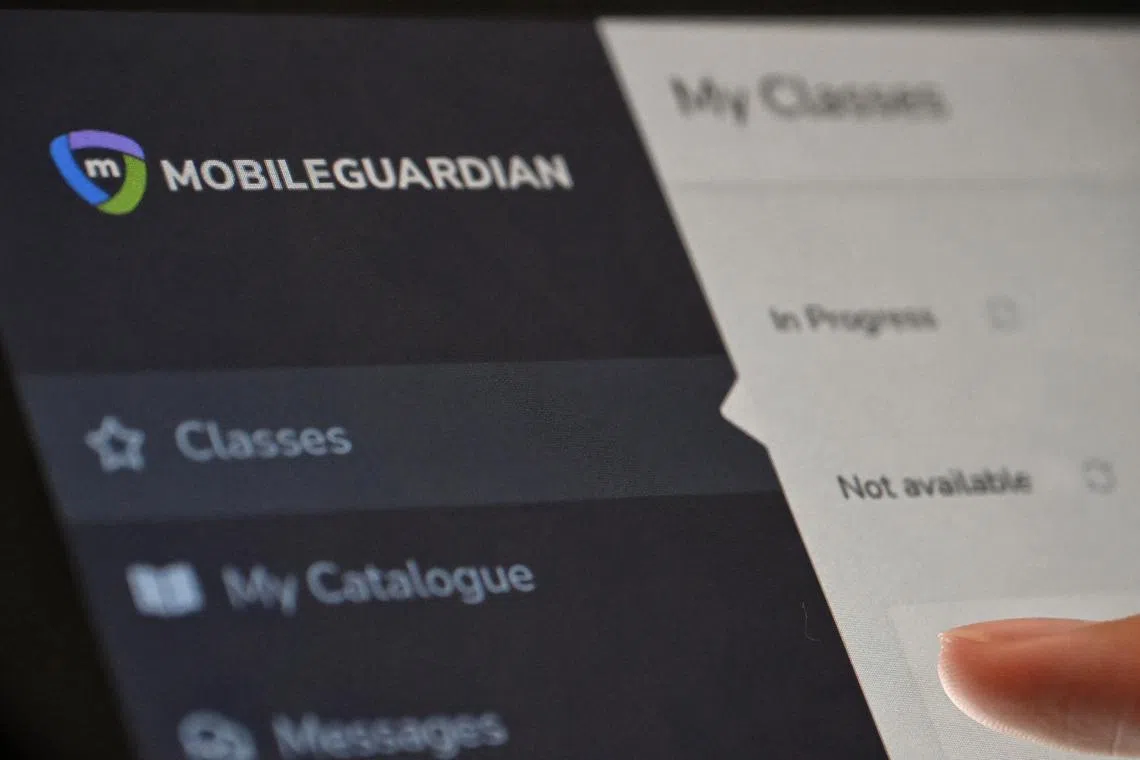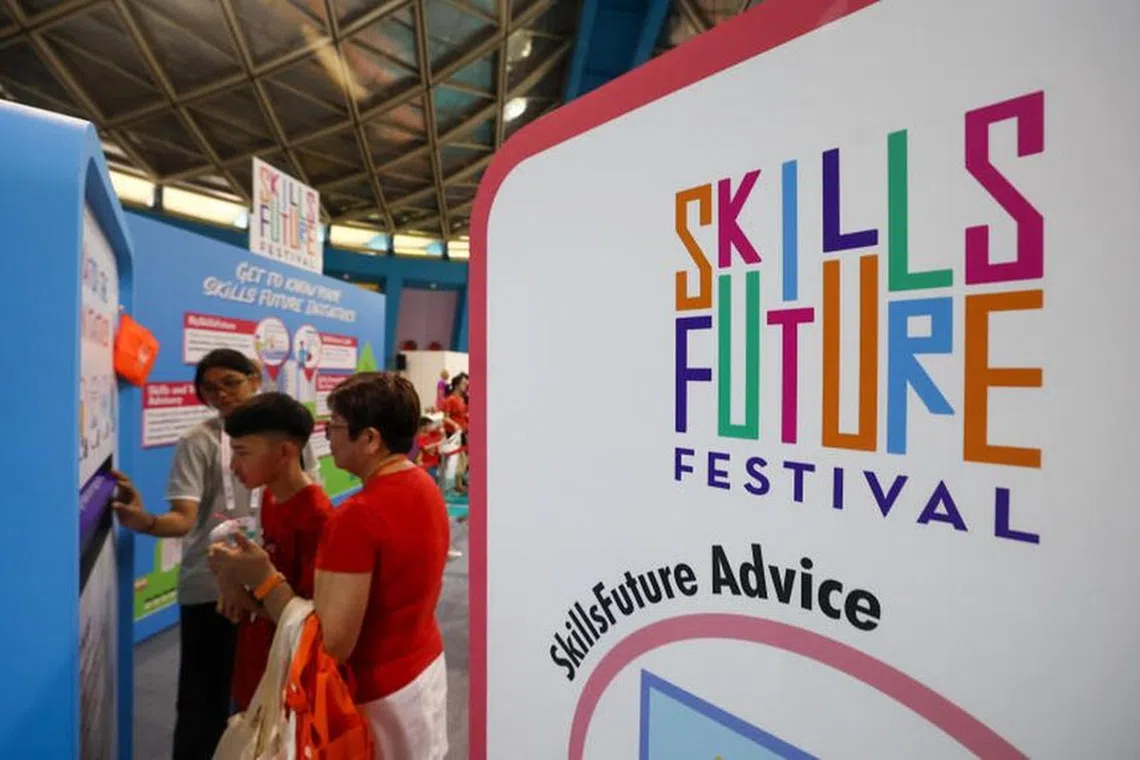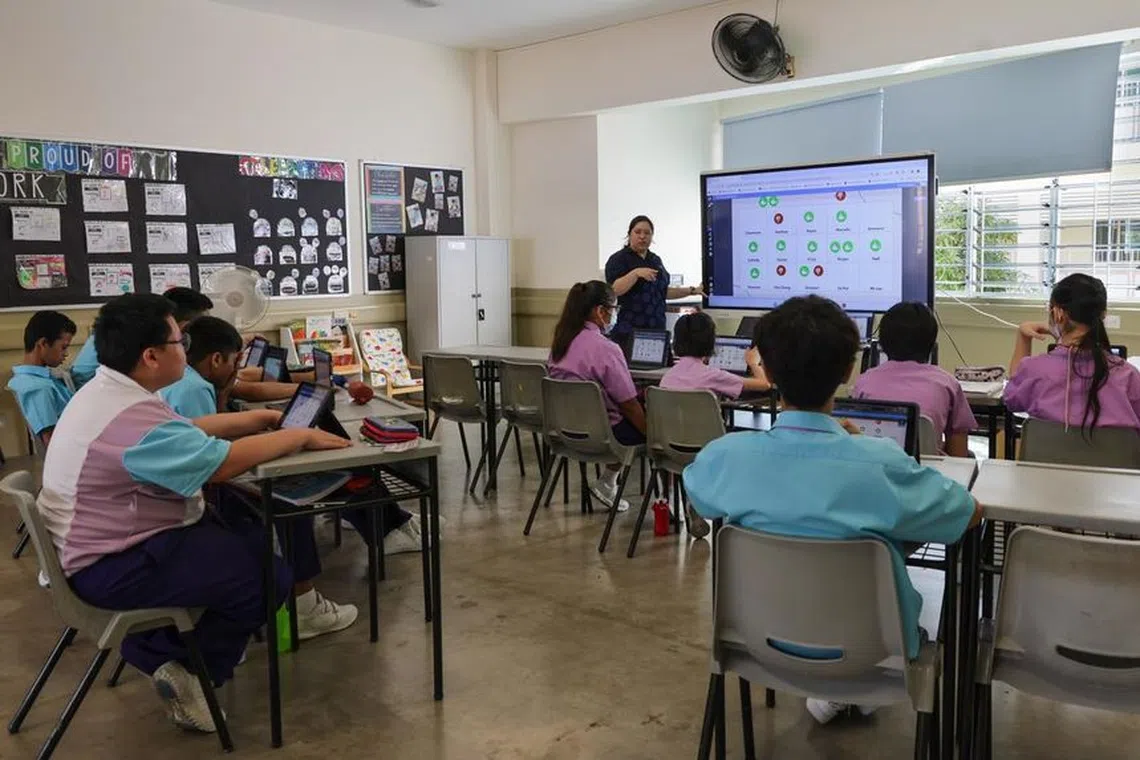2024 wrapped: The biggest education stories of the year, and what’s next
Sign up now: Get ST's newsletters delivered to your inbox

The Gifted Education Programme will undergo its biggest refresh since it began in 1984, and end in its current form.
PHOTO: MOE
SINGAPORE – Relooking the Gifted Education Programme and Direct School Admission exercise for secondary schools. Cyber-security breaches of the Mobile Guardian app. New measures to raise the quality of training courses for adults.
Here are the top developments in the education sector in 2024, along with what to expect for 2025 and beyond.
1. GEP revamp
A 40-year-old programme catering to the top 1 per cent of primary school pupils will be revamped in an effort to broaden opportunities across the education system.
The Gifted Education Programme (GEP) – which was created to stretch academically gifted pupils – will undergo its biggest refresh since it began in 1984, and end in its current form, Prime Minister Lawrence Wong said at the National Day Rally on Aug 18.
Pupils will no longer be selected through a single, two-stage test in Primary 3, and will not transfer out of their original schools to nine specific centres if chosen, as is the case now.
Instead, they will be selected through a variety of measures, including teachers’ observations and one standardised test.
The programme, which is run in every primary school for higher-ability pupils, will expand to take in more pupils, and after-school classes will be set up for those who need additional support.
Over its history, concerns emerged about the programme’s exclusivity and perceptions that it promoted a narrow definition of giftedness.
Criticism that the programme privileged the children of parents with more resources also came to the fore, along with worries that GEP pupils were not mixing enough with others, leading to social issues.
The final selection exercise for the current GEP will be held for Primary 3 pupils in 2025.
The Ministry of Education (MOE) said the changes reflect a shift in understanding of gifted education – that intelligence and ability are developed over the course of an individual’s life, and can manifest in specific areas, such as English or mathematics.
2. Teacher-parent boundaries
Teachers are not required to give out their personal phone numbers
Instead, teachers should use official communication channels like e-mail or office numbers, as part of the updated Guidelines for School-Home Partnership, to help them focus on their core duties during school hours and ensure they have time to rest and recharge after work.
Schools can adapt the guidelines based on their needs, in consultation with teachers and parents.
While teachers are not expected to give out personal numbers, MOE said some chose to during the Covid-19 pandemic for convenience. Parents should contact teachers via e-mail or the school office for urgent matters, except in emergencies requiring immediate attention.
3. Mobile Guardian saga

The latest incident occurred in August 2024, when a cyber-security breach affected 13,000 devices, with one in six devices losing data.
ST PHOTO: KUA CHEE SIONG
New device management applications – which are meant to restrict usage of devices – will be made available to students by January 2025, following the termination of Mobile Guardian’s services
The latest incident occurred in August,
Mobile Guardian is a device management application that helps parents manage their children’s device use by restricting screen time and access to specific websites and apps.
During another incident in July, more than 1,000 students from at least five secondary schools reported Wi-Fi connection problems, access issues and trouble with their devices because of a glitch in the app. This was due to human error in configuration, and separate from the cyber-security breach.
And, in April, Mobile Guardian’s user management portal at its headquarters in Surrey, Britain, was hacked, resulting in a data leak involving the names and e-mail addresses of parents and teachers of five primary schools and 122 secondary schools in Singapore.
Legal action has been taken against the contractors involved in the various incidents, said Mr Chan.
Since November, students with school-issued Chromebooks have had a new device management application, Lightspeed Systems,
4. Keeping skills relevant

All Singaporeans aged 40 and above were given a $4,000 SkillsFuture Credit top-up in May 2024.
PHOTO: LIANHE ZAOBAO
To encourage mid-career workers to refresh their skills and progress in their careers, all Singaporeans aged 40 and above were given a $4,000 SkillsFuture Credit top-up in May.
This was part of the new SkillsFuture Level-Up Programme to support mid-career Singaporeans in staying relevant in a changing economy.
Those who wish to pursue another full-time diploma at polytechnics, the Institute of Technical Education (ITE) and arts institutions will also be given subsidies from academic year 2025.
Usage of the $4,000 top-up – which has no expiry date – will be confined to selected training programmes with better employability outcomes. These include part-time and full-time diplomas, as well as post-diploma and undergraduate programmes.
Younger Singaporeans will receive the same top-up once they reach 40.
Those aged 40 and above will also be given a monthly training allowance when they enrol in selected full-time courses from 2025, to partially offset income loss from taking time off work.
In addition, ITE graduates aged 30 and below will get a total of $15,000 in top-ups when they pursue a diploma.
The new ITE Progression Award is aimed at helping them secure better career progression prospects. More than 7,000 ITE graduates are expected to enrol in an eligible diploma each year, said MOE.
5. A boost for special education

Starting salaries for special education classroom teachers and teacher aides rose by up to 15 per cent and 17 per cent, respectively, in 2024.
ST PHOTO: GIN TAY
Starting salaries for special education (Sped) classroom teachers and teacher aides rose by up to 15 per cent and 17 per cent, respectively, in 2024.
This was among moves to bring the Sped sector in line with mainstream education, in terms of professional development opportunities for educators.
By 2026, Sped classroom teachers are expected to receive monthly salaries ranging from $3,000 to more than $7,000, while teacher aide salaries will range between $2,000 and over $4,000, said MOE.
Also, nine Sped schools, which serve students with autism spectrum disorder and multiple disabilities, are expected to reduce fees by up to 60 per cent by mid-2025, resulting in the maximum monthly fees chargeable for Singaporean students dropping from $150 to $90.
Educators in Sped schools who show potential will be given more avenues to progress and become leaders through the Sped Leadership Development Programme, which starts in 2025.
Looking ahead
1. Review of direct admissions
Changes are in store for pupils hoping to use the Direct School Admission (DSA) scheme
Mr Chan said in Parliament on Oct 15 that the scheme will be reviewed with three aspects in mind: ensuring that schools focus on students’ development, the selection process remains objective and transparent, and the scheme continues to be accessible.
The DSA scheme, introduced in 2004, provides a pathway for Primary 6 pupils to gain early admission into the secondary school of their choice using non-academic talents, like sports and the arts.
Over the years, the scheme has drawn criticism that it provides an advantage for wealthier families who can afford private coaching and preparatory classes.
MOE has made several refinements to DSA, such as removing application fees and expanding the intake of students.
In 2024, two cases of improper processes involving DSA came to light – a school table tennis coach was dismissed for recruiting students to his private academy, and a basketball coach allegedly took $45,000 from parents to secure school placements.
Mr Chan said MOE’s review will ensure that schools focus on providing opportunities that add value to the development of their students.
The review will also look at ensuring that students are recognised not just for their performance, but also for their potential in specific talent areas.
2. Mother tongue languages
More students will be allowed to study their mother tongue languages (MTLs) – Chinese, Malay or Tamil – at a higher level in secondary schools as part of a raft of efforts to shore up bilingual education.
From 2026, pupils who do well in the subject in the Primary School Leaving Examination (PSLE) will be able to take higher mother tongue languages (HMTLs) in Secondary 1, regardless of their overall PSLE score.
These are pupils who score AL1 or AL2 – the two highest possible scores – in their MTLs, or a distinction or merit in HMTL in the PSLE.
In the current system, pupils must do well across all four subjects in the PSLE to qualify to study HMTL in secondary school.
MOE said that it expects as many as 1,000 more students to take HMTL under the revised criteria, depending on performance and interest.
More than 7,000 students take HMTL today, or about one in five in each cohort, it added.
3. Higher standards for adult training
Training courses in SkillsFuture Singapore’s directory are being held to higher standards, with those with low ratings to be weeded out, as part of efforts to raise the quality of such programmes.
From Jan 1, 2025, courses due for renewal must meet new criteria, including achieving at least a 75 per cent attendance rate. Providers must also continue to ensure their courses are relevant to industry needs.
By June 2026, courses will have to secure a minimum response rate of 75 per cent for their feedback survey, and not be ranked in the lowest-quality category.
Previously, course renewals required showing activity during their validity period and industry relevance.
All new measures will be rolled out by June 2026.
Elisha Tushara is a correspondent at The Straits Times, specialising in Singapore’s education landscape.
Gabrielle Chan is a journalist at The Straits Times, and covers everything related to education in Singapore.
Ng Wei Kai is a reporter at The Straits Times, where he covers politics.


